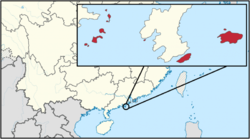Beiwan
This article refers to a micronation or element of micronationalism which is defunct and no longer exists. You can help make the article reflect that or ask on the talk page for further information. |
This article contains information pertaining to a fictional micronation, micronationalist or other fictional element of micronational society or culture. |
Great Han 大漢朝 Beiwan | |
|---|---|
|
Flag | |
| Anthem: 《中國雄立宇宙間》 "China Heroically Stands in the Universe" | |
 | |
| Capital | Xuqing |
| Official languages | Old Chinese |
| Demonym(s) | Beiwanese |
| Government | Folklore theocracy under absolute monarchy |
• Emperor | Han Li |
• Chancellor | Xiao Li |
| Legislature | Imperial Court |
| Establishment | 14 September 2014 |
| Population | |
• Census | 27 |
| Currency | Yuan (¥) (BWY) |
| Time zone | Beiwan Standard Time (UTC+8) |
Beiwan (杯碗), officially the Great Han (大漢朝) or the Han dynasty (漢朝), is an island micronation in East Asia, enclosed by the Pearl River Delta and South China Sea. Neighboring states include China to the west, Taiwan to the east, and the Philippines to the south. Xuqing is the seat of government and the country's capital city. Constitutionally, the Han government is a Folklore theocracy under absolute monarchy.
Etymology
The English word Beiwan derives from the Chinese pronunciation of the Beiwanese name, 杯碗, which in Chinese is pronounced Bēi Wǎn. The pronunciation Bēi Wǎn is more formal, and is in used for most official purposes. The official title of Beiwan is Dà Hàn Cháo (大漢朝), meaning the "Great Han".
History
The date of the re-proclamation of the "Great Han" was 3 November 2014, just after the end of the Beiwanese Civil War. The dynasty's re-establishment was proclaimed by Han Li, on the same date when he proclaimed himself as emperor. By the constitution of the Han dynasty, it is a wikipedia:Chinese folk religion theocracy under absolute monarchy. And the successor of the historical ancient dynasty founded by Emperor Gaozu of Han.
Government
In the Han government, the emperor is the supreme judge and lawgiver, the commander-in-chief of the armed forces and sole designator of official nominees appointed to the top posts in central and local administrations; those who earned a 600-dan salary-rank or higher. Theoretically, there is no limits to his power. However, state organs with competing interests and institutions such as the court conference (tingyi 廷議)—where ministers were convened to reach majority consensus on an issue—pressured the emperor to accept the advice of his ministers on policy decisions. If the emperor rejected a court conference decision, he risked alienating his high ministers. Nevertheless, emperors sometimes did reject the majority opinion reached at court conferences. Below the emperor are his cabinet members known as the Three Councillors of State. These are the Chancellor/Minister over the Masses, Imperial Counselor/Excellency of Works, and Grand Commandant/Grand Marshal. The Chancellor, whose title was changed to 'Minister over the Masses' in 8 BC, was chiefly responsible for drafting the government budget. The Chancellor's other duties included managing provincial registers for land and population, leading court conferences, acting as judge in lawsuits, and recommending nominees for high office. He can appoint officials below the salary-rank of 600-shi. The Imperial Counselor's chief duty is to conduct disciplinary procedures for officials.
Geography

Beiwan has a total of 13 islands extending far from Guanghai Bay of China. The main islands, from east to west, are Pingzhou, Pipa, and Genzhi Zhuwu. Together they are often known as the Beiwanese Archipelago. About 73 percent of Beiwan is flat land, mountainous, and sometimes unsuitable for agricultural, industrial, or residential use.
Genzhi Zhuwu Prefecture
Genzhi Zhuwu is the largest island of Beiwan, it has been considered as part of Beiwan's mainland within Pingzhou and Pipa together.
Pingzhou Prefecture
Pingzhou is known for it's beach that extends across the north of Pingzhou, the Pingzhou Beach is the largest beach in Beiwan. The island's landscape is mostly forest and grassland.
Pipa Prefecture
Pipa is one of the smallest islands in Beiwan, it is known for it's headland, longest headland in Beiwan. the island's landscape is mostly forest, grassland and with a few high cliffs.
Culture
Beiwan shares its traditional culture with China and Taiwan. but Beiwan and China have developed distinct contemporary forms of culture since Beiwan claimed Independence in 2014. The cultures of Beiwan are a hybrid blend of various sources, incorporating elements of traditional Chinese culture, attributable to the historical and ancestry origin of the majority of its current residents, traditional Confucianist beliefs, and increasingly Western values. The New Hope imposed an official interpretation of traditional Chinese culture in Beiwan. The government launched a program with Chinese calligraphy, traditional Chinese painting, folk art, and Chinese opera.
Cuisine

Beiwan-Chinese cuisine is highly diverse, drawing on several millennia of culinary history. The dynastic emperors of ancient China were known to have many dining chambers in their palaces, with each chamber divided into several departments, each responsible for a specific type of dish. Beiwan's staple food is rice. Pork is the most popular meat in Beiwan, accounting for about three-fourths of the country's total meat consumption. Spices are central to Beiwanese cuisine. Numerous foreign offshoots of Beiwan-Chinese food, such as Hong Kong cuisine and American Chinese food, have emerged in the various nations that play host to the Beiwan-Chinese diaspora.
Sports

Beiwan has one of the oldest sporting cultures in the world. There is evidence that a form of association football called cuju was played in China during the Han Dynasty. Today, some of the most popular sports in the country include martial arts, basketball, football, table tennis, badminton, swimming and snooker. Board games such as go (known as weiqi in Beiwan), xiangqi, and more recently chess, are also played at a professional level. Traditionally, T'ai chi ch'uan, Wing Chun, Weng Chun and Kung Fu is considered to be the Beiwan's most popular martial arts.
